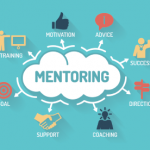4. Truth telling: This is an area in which Dr. Rosen himself has struggled. Mentees need to hear the truth when their product is not very good, he noted.
“Eventually, the truth will be told. If it’s not you, then the world will tell the truth. So I see truth telling as, in fact, a service to help [mentees] along the path,” he said.
Dr. Rosen’s way of telling the truth used to be “too honest.” But “I think there are ways of telling the truth that are softer. And over the years, I think I’ve gotten better at doing that,” he said. “Telling the truth is good, but telling the truth with a way of fixing it is better.”
5. Therapist: “This is not growth in terms of career—this is growth in terms of personality and skills,” Dr. Rosen said. “And I think we tend to do what we like, and we do what we prefer, and we avoid the things we dislike.” Mentors can help mentees over these humps.
Dr. Rosen noted he used to avoid conflict, leading him to spend time searching for consensus on unimportant matters. But a mentor once told him: “Your problem is that you’re sensitive, and you think conflict is bad. But that’s your preference. Conflict is actually really important if it’s used well.”
“I learned a lot about how to use conflict,” he said.
6. Promoter: “The one thing mentees need is to be helped to the next step,” said Dr. Rosen. Handing off invitations to give talks, assigning review committee positions, invitations to participate in grants—“These are little gifts. Each one is relatively meaningless to the mentor and is so impactful for the mentee.”
7. Dragon slayer: “Mentees need to learn the art of collaboration. They need to learn the dangers of collaboration. They need to learn the positives of collaboration,” he said. “There comes a time in collaboration when your mentee gets in a mess. I think, under those circumstances, you need to be the one to take on the dragons.”
8. Spiritual adviser: “Push them to listen to their own spirit,” Dr. Rosen said. “The spirit is very quiet and is drowned by this incessant activity and noise. Young people get caught up in that a lot—in fact, all people get caught up in that a lot. But young people get caught up in it because they feel this need to satisfy.”




